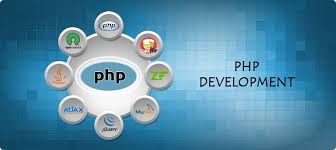Popular Frameworks in PHP
PHP, known as the most popular server-side scripting language in the world, has evolved a lot since the first inline code snippets appeared in static HTML files.
These days’ developers need to shape complex websites and web apps, and above a certain complexity level it can take too much time and hassle to always start from scratch, therefore came the need for a more organized way of development. PHP frameworks provide developers with a satisfactory solution for that. To go the frameworks it is required to go through PHP training in Chandigarh.
In this post, we carefully handpicked 10 popular PHP frameworks that can finest facilitate and streamline the process of backend web development.
1. Laravel
Although Laravel is a comparatively new PHP framework (it was released in 2011), according to Site point’s latest online survey it is the most popular framework among developers. Laravel has a huge ecosystem with an immediate hosting and deployment platform, and its official website offers many screencast tutorials called Laracasts.
Laravel has several features that make rapid application development possible. Laravel has its own light-weight templating engine called “Blade”, elegant syntax that facilitates tasks you regularly need to do, such as authentication, sessions, queueing, caching and RESTful routing.
2. Symfony
The components of the Symfony 2 framework are used by several impressive projects such as the Drupal content management system, or the phpBB forum software, but Laravel – the framework listed above – also trusts on it. Symfony has a wide developer community and numerous ardent fans.
Symfony Components are refillable PHP libraries that you can complete different tasks with, such as form creation, object configuration, authentication, templating, and many others. You can install any of the Mechanisms with the Composer PHP dependency manager. The website of Symfony has a cool showcase section where you can take a peek at the project's developers skilled with the help of this handy framework. Learn more about these frameworks through PHP Course in Chandigarh.
3. CodeIgniter
CodeIgniter is a lightweight PHP framework that is 10 years old (initially released in 2006). CodeIgniter has a very straightforward installation process that necessitates only a minimal configuration so it can save you a lot of hassle. It’s also a perfect choice if you want to avoid PHP version struggle, as it works nicely on almost all shared and dedicated hosting platforms
CodeIgniter is not based on the MVC development pattern. Using the Controller classes is a must, but Models and Views are uncompelled, and you can use your own coding and naming conventions, evidence that CodeIgniter gives great liberty to developers. If you download it, you’ll see it’s only about 2MB, so it’s a lean framework, but it permits you to add third-party plugins if you need more functionalities.
4. Yii 2
If you select the Yii framework you give a lift to the performance of your site as it’s faster than other PHP frameworks, because it widely uses the lazy loading technique. Yii 2 is purely object-oriented, and it’s based on the DRY (Don’t Repeat Yourself) coding concept, so it provides you with a clean and logical code base.
Yii 2 is integrated with jQuery, and it comes with a set of AJAX-enabled features, and it implements an easy-to-use skinning and theming mechanism so it can be a great selection for someone who comes from a frontend background. It has a powerful class code generator called Gii that facilitates object-oriented programming and rapid prototyping and provides a web-based interface that permits you to interactively generate the code you need. All these frameworks can be learned from a PHP institute in Chandigarh.
5. Phalcon
The Phalcon framework was released in 2012, and it gained popularity among PHP developers. Phalcon is said to be fast as a Falcon since it was written in C and C++ to reach the highest level of performance optimization possible. Good news is that you don’t have to learn the C language, as the functionality is exposed as PHP classes that are ready to use for any application.
6. CakePHP
CakePHP is a decade old (the first version was released in 2005), but it’s still among the most popular PHP frameworks, as it has always succeeded to keep up with time. The latest version, CakePHP 3.0 enhanced session management, enhanced modularity by decoupling several components and augmented the ability to create more standalone libraries.
CakePHP has a really amazing showcase, it powers the websites of big brands such as BMW, Hyundai, and Express. It is an outstanding tool for crafting web apps that need security, as it has many built-in security sorts such as input validation, SQL injection prevention, XSS (cross-site scripting) prevention, CSRF (cross-site request forgery) protection, and several others.
7. Zend Framework
Zend is a robust and stable PHP framework packed with a lot of configuration options, therefore, it’s usually not suggested for smaller projects but brilliant for more complex ones. Zend has associates such as IBM, Microsoft, Google, and Adobe. The coming major release, Zend Framework 3 will be optimized for PHP 7, but will still support PHP 5.5 onwards.
The current release, Zend Framework 2 also has many cool features such as cryptographic coding tools, an easy-to-use drag and drop editor with a livelihood for front-end technologies (HTML, CSS, JavaScript), immediate online debugging and PHP Unit testing tools, and a connected Database Wizard. Zend Framework was shaped with the Agile methodology that facilitates delivering high-quality apps to enterprise clients.
8. Slim
Slim is a PHP micro framework that provides you with everything you need and nothing you don’t. Micro-frameworks are minimalistic in design; they are outstanding for smaller apps where a full-stack framework would be an overstatement. Slim’s creator was inspired by a Ruby microframework called Sinatra. You can learn more about these Frameworks by Attending Classes of PHP frameworks from a renowned Academy.





Comments
Post a Comment